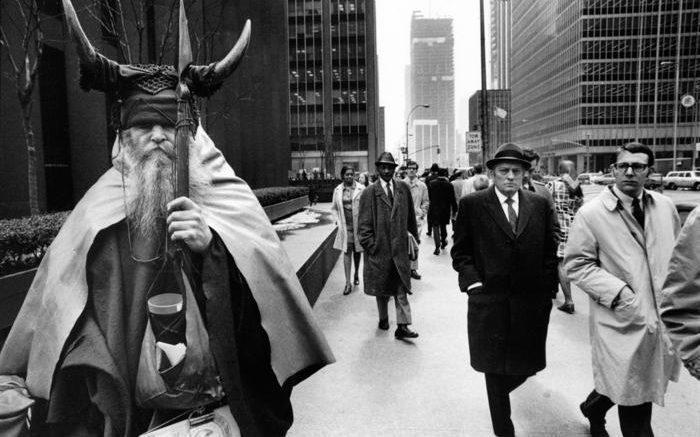Nearly thirty people gathered for a Candor Historical Society event held at the Candor Town Hall on Jan. 25 to discuss and remember the life of legendary musician, Louis Thomas Hardin.
Historical Society members, community residents, and guests shared photos, newspaper clippings, and other sources of information about Hardin, known worldwide as Moondog.
Moondog lived in Candor for a number of years and spent time in the Village of Owego, yet was best remembered as a New York City original, coined the “Viking of 6th Avenue.” Extremely proud of his Nordic heritage and interested in mythology, Moondog was often found on 6th Avenue, between 52nd and 55th Streets, wearing a Viking helmet along with his homemade attire.
One of the most incredible facts about Moondog was that he was blind, since the age of 16. So his travels, and the composure of his music is a fact that adds utter brilliance to his mystique.
Plug the word “Moondog” in the search field of a historical newspaper website and hundreds of matches are returned with publication dates going back to the late 1940’s.
From the “blind trouba-doorway minstrel” to “Upstate’s blind Viking-poet composer,” and then, “the blind curbatone Mozart,” to the “Mid-town Manhattan guru,” Moondog became a favorite topic of the press, and most often fondly described.
Interesting, a New York Times article states that when asked by pedestrians on the street where he was from, Moondog would reply, “Sasnak” (which is Kansas, backwards).
Born in Kansas in 1916, and raised in Missouri and other Midwest states, it was an accident at the age of 16 while playing with blasting caps that took Hardin’s eyesight. He went on to learn Braille while attending several music schools. Hardin passed away in Munster, Germany in 1999 at the age of 83, and a book about his life describes him as “one of America’s great originals,” and “the most famous eccentric in New York.”
The name he identified with, Moondog, was derived from listening to a dog he had as a child that howled at the moon with him.
Attendees at the Candor Historical Society event shared that Moondog was a “gentle man, empathetic, and a decent guy.”
Although initial perception may have labeled Hardin negatively, the word genius tends to best describe the man who was ultimately seen as a prominent talent in music history, and who influenced many composers and musicians.
One of Moondog’s songs, “All is Loneliness,” was recorded twice by music icon, Janis Joplin.
Following several years in New York City, by the late 1950’s Hardin was looking to get out of the city and ended up choosing Candor, with the intention of commuting back-and-forth. It is thought that the rural area of Candor appealed to Hardin since it is similar to areas where he grew up.
Event attendees described Moondog’s property as several acres and the home as a two-room shack with a roof covered in green tarpaper, and where you had to duck your head to make it through the front door.
They shared that Moondog would often be found in front of the Smoke Shop on North Avenue in Owego, perhaps because that is where the bus stop was located, and where he would stand and recite poetry.
Known for his masterful orchestral suites and madrigals, as well as incorporating and mixing street noises and other clever sounds into his compositions, Moondog also made money in his early days selling radio jingles and tunes for television commercials. From Carnegie Hall to the Tonight Show with Johnny Carson, Moondog became well known in the entertainment world, and even to such notables as Leonard Bernstein, Arthur Toscanini and Benny Goodman.
Perhaps one of the most publicized stories about Moondog occurred in 1954 when he won a New York State Supreme Court case against famous Cleveland disc jockey and later Rock and Roll Hall of Fame inductee, Alan Freed, who had used the name “Moondog” for his on-air show as well as the titles of Moodog’s recordings. The case identifies Goodman and Toscanini as testifying on Hardin’s behalf.
Moondog traveled to Germany in 1974 and ended up staying. “World-renowned” was used to describe his time there, and where he toured all throughout Europe. Following several albums in the States and Europe, Moondog’s last known visit to the U.S. was in 1989 when he conducted the Brooklyn Philharmonic Chamber Orchestra.
Moondog’s musical talent also included his instrument inventions, one of which was a triangular-shaped harp known as the “oo,” and another, a percussion instrument called the “trimba,” just two of many that he leaves behind as part of the legacy to his genius.
A full-length documentary about Moondog’s incredible life has been in the works for some time, and it is hopeful it will be released later this year.
For additional news about Moondog, follow the Candor Historical Society on Facebook or their website, http://candorhistoricalsociety.weebly.com.



Remember summoning enough courage to go talk to him when I was a child and he was sitting on old wooden porch in front of Robinson’s store. What a fascinating man with a huge and clear voice. I was awestruck